For years the transgressions have been piling up. Privacy breaches. Data mining exposés. Obvious violations of trust. Denial used as a battle weapon. Hollow apologies. Despite all this, most Facebook users have not yet felt concerned enough to leave the platform.
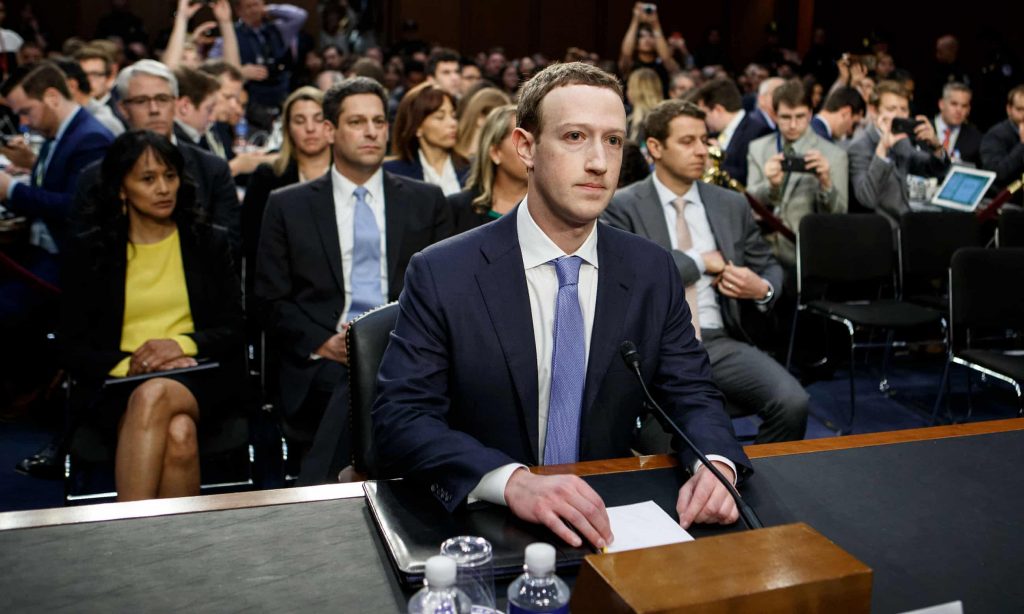
Is the sense of staying updated with friends and family too strong? Or is it free access to those deeply poignant, irresistably charming, or emotionally moving posts? For many, Facebook has become too central to daily life to just let go.
But maybe – just maybe– we’ve reached the last straw. Could a major exodus from Facebook finally transpire? The facts have piled up. The evidence is compelling. Has the time come to impeach Facebook?
Many years ago in a meeting with peer executives, I was discussing social media and how it might affect our organizations. Facebook had emerged, and we thought it might be worth trying. We made the CEO equivalent of a pinky promise and agreed to set up FB accounts. Back then, few of us had spent much time on social media.
We became each others’ first Facebook friends. From there we took different paths. Some became regular users. Some dove into other social media platforms. We didn’t know it, but we were part of the exponential growth that brought Facebook into everyone’s lives – and brought billions into Mr. Zuckerberg’s pockets.
I never got hooked. Never developed the habit of logging in and cycling through a string of posts, despite the attraction of a “feed” that always threw choice entertaining morsels my way. Personal posts seemed hollow compared to meeting in person – and those brief exchanges may have even reduced the likelihood of spending real time together. If Facebook was an implant, my psyche rejected it. I just stopped going there.
Which made me an outlier. I’m often the last to know what’s going on. (I know, cluelessness plays in here, too!) When well-meaning friends and allies can’t simply refer me to their Facebook page for updates, it’s as if I disappeared. When a group uses Facebook instead of building an actual website, I miss out on what they are doing.
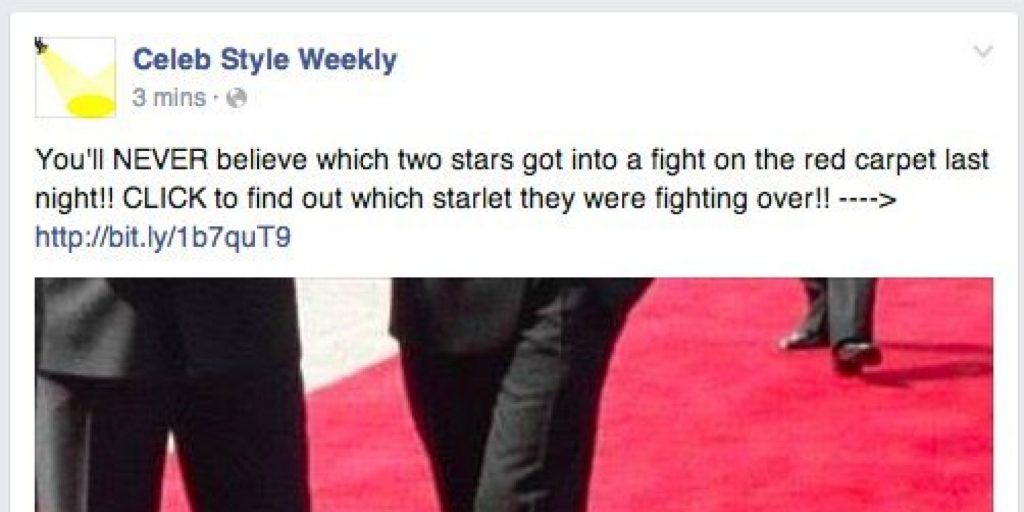
This information gap has been an inconvenience, not a real problem. But it’s fascinating how people treat outsiders to a predominant medium. Some kind souls go out of their way to email me info from important posts. Many just shrug: there’s no cure for willful ignorance. A few reveal a guilty grin, admitting they wished they could get off Facebook.
Evangelism isn’t my thing. I haven’t eaten meat for 40 years, but haven’t converted anyone to vegetarianism. I care deeply about the climate, but guilt-tripping people who drive everywhere does nothing for me – and probably doesn’t help the climate either.
But I’m not shy about taking a stand.
While Facebook undoubtedly offers a certain fun and connectivity, I see it giving little to actual friendships, eroding healthy attention spans, and often supplanting actual reading, thinking and genuine discourse. It sells personal data from within the mirage of community. It employs “narrowcasting,” the phenomenon of feeding people what they want to hear, thus turbocharging social polarization. It thrives on labeling, name calling, and extremism. Facebook also buys emerging competitors, stifling choice while expanding its empire.
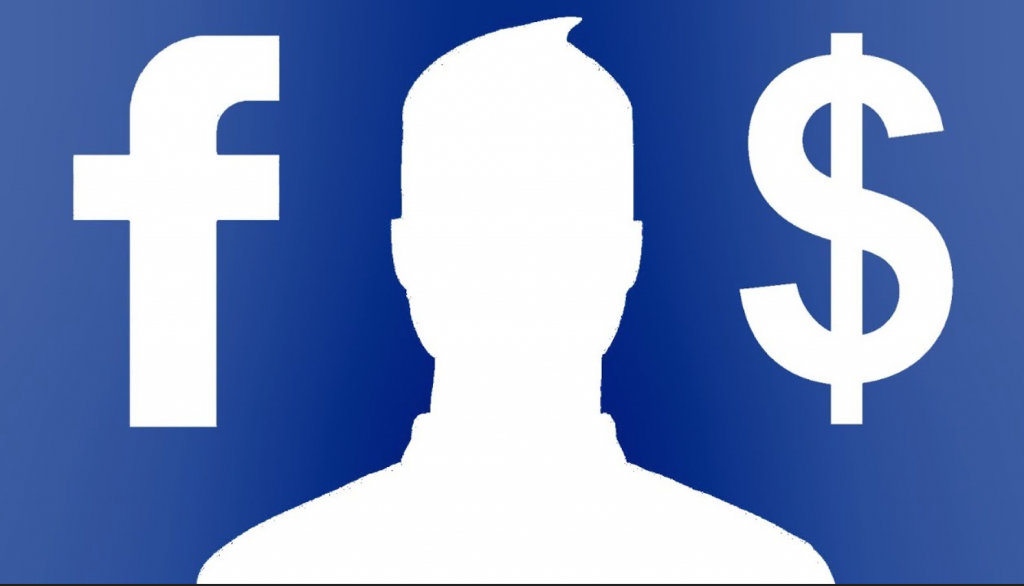
Social media that is free to the user turns users themselves into the product that social media empires sell. Users swap their marketable data for access to cat videos and other entertainments.
These concerns made me a Facebook abstainer… but not an antagonist.
Now, a more compelling reason to impeach Facebook has arisen: Facebook as a menace to democracy. On one hand we have its CEO singling out a leading presidential contender and Facebook critic as a threat. On the other hand we have Facebook’s new policy embracing fact-free ads.
While the much-maligned “mainstream media” are finally saying that they’ve had enough and are refusing to air obvious falsehoods, Facebook shrugs. Meanwhile, candidate Warren, who for all her flaws is speaking out against monopolies and disinformation, has got Zuckerberg’s boxers in a knot.
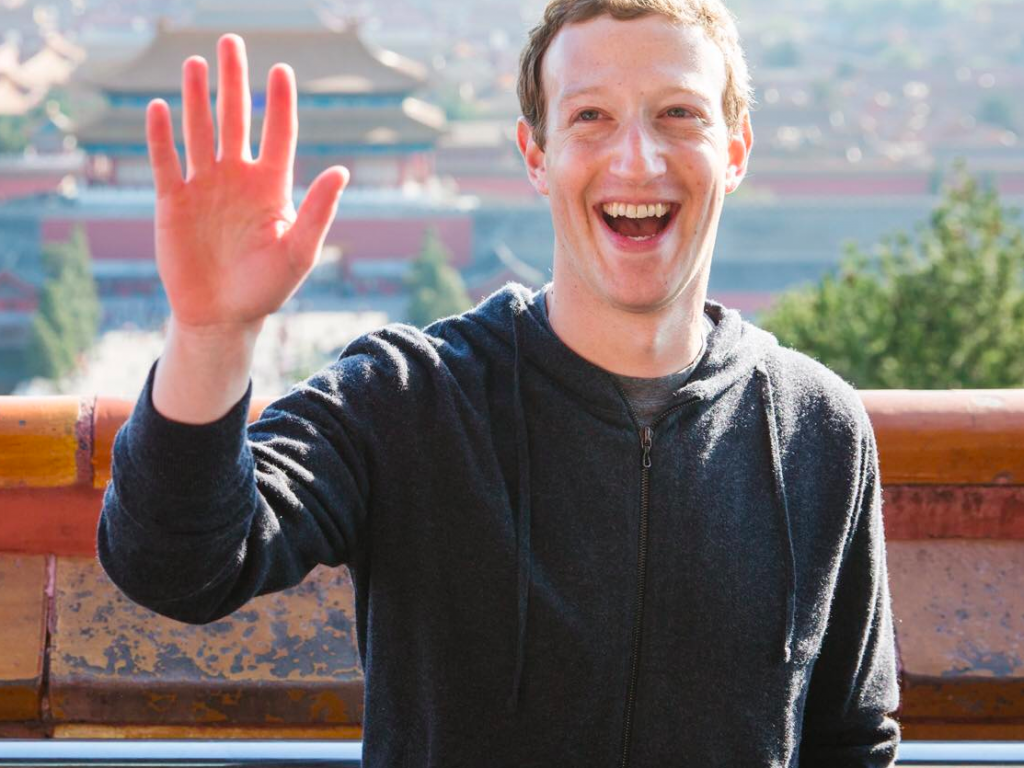
Here’s what Mr. Z. said about the threat he perceived:
“You have someone like Elizabeth Warren who thinks that the right answer is to break up the companies … if she gets elected president, then I would bet that we will have a legal challenge… at the end of the day, if someone’s going to try to threaten something that existential, you go to the mat and you fight.”
Well, Mr. Z., the existential threat to your business is that it purports to connect people while exploiting them. People will put up with a lot of exploitation before they decide they’ve had enough. But given recent events surrounding your money machine of exploitation and data mining, I hope the time people stop supporting your empire has arrived.
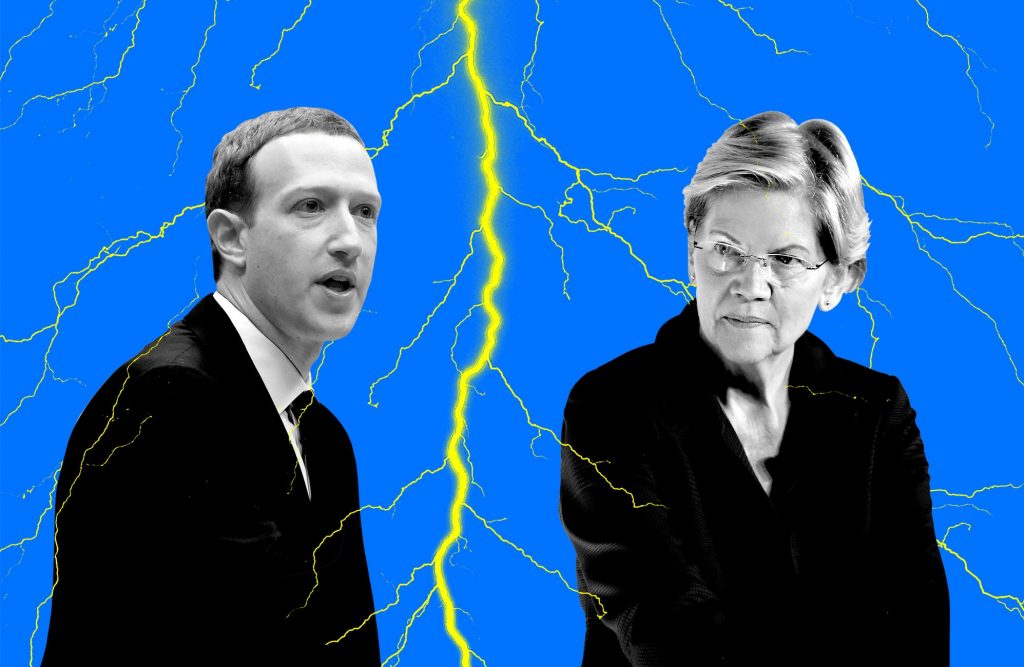
A Charlie Warzel essay called “Could Facebook Actually Nuke Elizabeth Warren’s Campaign?” unfolds Facebook’s decision to weaken their “Misleading or False Content” rules. Beyond becoming weaker, he notes, they also now exempt political ads from any accountability to the truth whatsoever.
Apparently, yelling “Fire!” in a crowded theatre fits into Facebook’s definition of free speech.
Facebook’s willingness to advance lies undermines the First Amendment. Further, Warzel describes how social media best serves extreme stances that draw outsized attention. The very nature of Facebook, he asserts, degrades political discourse: “With its algorithmic mandate of engagement over all else, Facebook has redefined what it means to be a good candidate — and provided a distinct natural advantage to those who distort the truth and seek to divide.”
Immediately following Facebook’s policy change, the US president increased his Facebook ad budget to $1.5 million per week. Less truth: More revenue for FB!
While truth may hinder Facebook’s profits, polarization feeds them. The problem isn’t unique to America. Phillipine president Rodrigo Duterte uses Facebook to great success. Duterte systematically fired up enough voters with false information and memes triggering fear and anger to propel himself into the presidency. After his election, Facebook became a tool for harassing his critics. Democracy suffers under Facebook everywhere Facebook reaches (everywhere).
Why might people who know all this remain Facebook users? We tend to tell ourselves that “others might be swayed, but not me.” But that view is naïve. We congratulate ourselves on our capacity to resist manipulation. But have you ever found yourself spending more time on Facebook than you’d really planned to? Influencing users IS Facebook’s business model. And it works.
Psychologists have proven that intermittent reinforcement prolongs involvement. Purchasing lottery tickets is an an example. The game is calculated to produce small rewards with just enough frequency to keep people buying tickets, always in hope of the big win… despite vanishingly slim chances.
Similarly, Facebook inserts attention-grabbing bits crafted to maximize the duration of your attention. Warzel calls this the “algorithmic mandate.” The more time you spend on Facebook, the more Facebook wins, since like television in its day, FB earns revenue based on how many eyeballs view its ad content. And the more time you spend, the better the algorithm gets to know you.

Jaron Lanier, in his book Ten Arguments for Deleting Your Social Media Accounts Right Now, puts it this way: “The algorithm is trying to capture the perfect parameters for manipulating a brain, while the brain, in order to seek out deeper meaning, is changing in response to the algorithm’s experiments… Because the stimuli from the algorithm doesn’t mean anything, because they genuinely are random, the brain isn’t responding to anything real, but to a fiction. That process – of becoming hooked on an elusive mirage – is addiction.”
Amplifying Facebook addiction is the network effect. A network only works if everyone (or nearly everyone) is hooked into it. Being an outlier, I’m very conscious of the powerful ingroup-outgroup nature of Facebook. The network effect also reinforces Facebook’s market dominance and tends to suppress any competition that might arise. When I’ve suggested that people quit Facebook, they tend to say “But then what?” The network effect works.
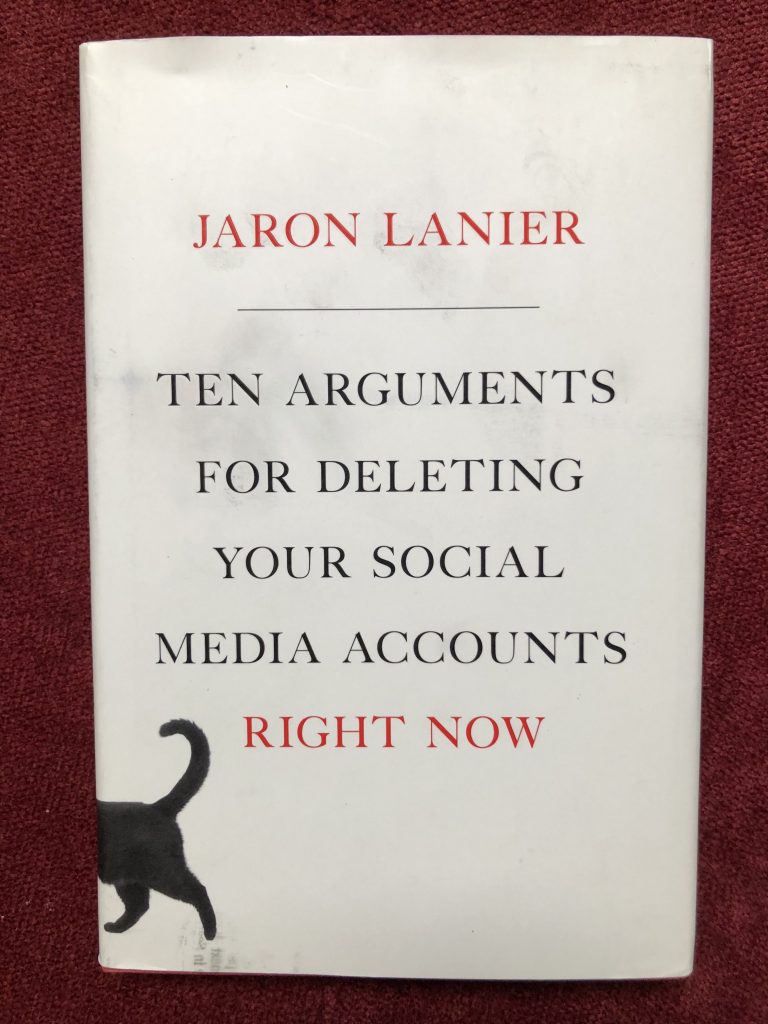
According to Lanier, the way social media influences politics is biased, “not towards the left or right, but downwards.” On a platform where stimulating emotional response is the goal and negative emotions are easier to trigger, it makes sense that social media would precipitate anger, sadness, and isolation.
Could Facebook’s problems be fixed? Is Facebook accountable to anyone?
In a court decision last summer, Facebook was hit with a $5 billion penalty for privacy violations. This settlement grew out of the Cambridge Analytica scam in which 87 million FB user accounts were scraped for data on their likes, preferences, and “psychographic” profiles. Why? To better target users in advertisements.
Five billion dollars buys a lot of cappuccino. But the fine was expected to be much larger. Regulators from the FTC were limited in what they could do, partly because strong privacy statutes are lacking, and partly because the entire FTC budget is less than half of one percent of Facebook’s $55 billion revenue. Along with keeping the fine modest (keep in mind that FB has a long history of privacy violations) Facebook successfully pre-empted any accountability of the executives who define the corporate ethos of selling, not protecting, privacy. After the fine was announced, Facebook’s stock price soared. Does that hint that the penalty will result in change?

Generally, it’s all about money. But the Cambridge Analytica scheme was driven in part by a calculated strategy for political manipulation. Remember, Cambridge Analytica wasn’t selling deodorant. They were closely linked to extreme-right political operatives, including the advocates for Brexit, Senator Ted Cruz, and later, the Donald Trump campaign.
Which brings us back to Zuckerberg vs. the Common Good: The Case for Impeaching Facebook.
There are no meaningful limits on a company that wields so much economic and social power.
A clear pattern of lies and betrayal has characterized Facebook’s history.
This platform may well have swayed the 2016 election to Trump. It very likely may undermine American voters’ ability to genuinely select their next president.
What can one do? The only thing Facebook has to sell is its users. Stop being one. Impeach Facebook from your life.
Power never yields on its own. And Mr. Z. is nothing if not powerful. He will fight.
Where will you stand in that battle?
Your comments would be very welcome!
Note: As this post was going to press, Mark Zuckerberg gave a talk at Georgetown University, in which he vigorously defended fact-free free speech, even making reference to such leaders as Martin Luther King, Jr. and Frederick Douglass. It is hard to see how citing figures far more ethical and righteous than himself will elevate Zuck’s greed-driven agenda. But who knows? There are quite a lot of unquestioning Facebook users out there…
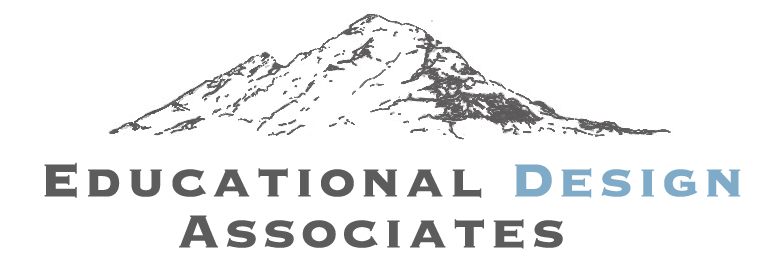
Enjoyed the article! Would have been interesting to hear speculation on how social media could be made and managed (coop style?) ethically. Seize the memes of production?
Great comment, and thanks for the awesome phrase “seize the memes of production!” That one is destined to catch fire, being both funny and poignant.
What will take the place of Facebook? The question is vital. Few of the folks I’ve talked with would actually choose Facebook if they had a choice. Right now they really don’t. Jaron Lanier, whom I quoted in this essay, suggests in his book Ten Arguments for Deleting Your Social Media Accounts Right Now that while some compare social media to the tobacco industry, he prefers the metaphor of lead paint. After the toxicity of lead became known, nobody stopped painting their houses. Instead, “smart people waited to buy paint until there was a safe version on sale. Similarly, smart people should delete their accounts until nontoxic varieties are available.”
The critical act is to first separate. Then resolve. Imagining that a reasonable Facebook substitute will emerge while people are still using Facebook is unrealistic. People have to make a break. That courage, that resolve, that readiness for change, is a necessary prerequisite.
Then what? What comes next is beyond me to define. But most of the front end of Facebook isn’t the problem. It is the corrupt corporate bones. So a new option could certainly provide a similar user experience without the profit-driven “algorithmic mandate.” The precedents of, say, Wikipedia, which aced out all the proprietary encyclopedias to become the dominant information platform, and Open Street Map, which is striving to supplant the dominant GoogleMaps, show that a donation-driven platform is at least theoretically possible. A subscription model might also be workable, similar to how the New York Times manages access to the excellent journalism they offer. One way or another, the profit motive has to be eliminated or we’ll have Facebook 2.0 and all the same problems will recur.
Anyone have leads on viable open-source or nonprofit Facebook substitutes?
Two books I would recommend: Anti-Social Media: How Facebook Disconnects Us and Undermines Democracy by Siva Vaidhyanathan and Zucked: Waking Up to the Facebook Catastrophe by Roger McNamee. I read the former and it is excellent; the latter was discussed at length this morning on Democracy Now. Listen to that segment!
Thanks very much, Tom, for these suggestions! The evidence is mounting. Are there any Facebook users willing to weigh in on why they have, or have not, closed their Facebook accounts?
Good discussion all.
Facebook (and other SM) do indeed disconnect people. The path towards disconnection, however, is perhaps a slippery one and not evident at first. Getting involved with FB starts with a whoop – and a warm sense of being “amongst friends” and enjoying the “connection”. The soothing vibes continue as the feeling of satisfaction grows as one surveys the “cool online me” that is broadcast to the outside world for all to admire. From there the media expands its cloak by numbing the senses and ramping up the number of “connections” to make us feel that we really cannot afford to “miss out” on what is going on in our world. Voila, connection complete.
How to disconnect? How to rewire a brain? How to remake daily routines? How to convince people of the amazingly powerful (yet not reality based) echo chamber effect of social media – to the detriment of seeing the hand right in front of their face. Indeed, how to also replace the valid online connections that FB offer? (FB is one means by which parents in todays world glean what family are up to)
How to manage all this? As mentioned, Mark Z will not go shrinking away – the FBs have turned our addiction into a multi multi billion dollar business. Pretty sure he has the resources to lawyer up wherever he needs. Also, with SM at his disposal, can use campaigns of his own to perhaps sow uncertainty, distraction, overload (sort of like is being done on grand scale in other media such as Twitter). How to regulate this genie that impacts computers everywhere – rots of ruck!
My guess is most people will not intentionally close their FB accounts – the accounts will simply go dormant when a flashier product strikes the market or when they simply lose interest (like when the number of repeated ads within minutes hits 8!). Appealing to people to abandon FB for the sake of civics? – well, I guess I would not stake the ranch on that one. Most of us, after all, believe that we are smarter than most, and could never be fooled by any social media guises.
Here’s to hoping a group of talented young people will invent a new platform, based on actual person-to-person friendship, that becomes contagious and heart-warming.
Well stated, Andy. I think the key question, which I spoke to earlier and that you addressed nicely, is “Where is the tipping point?” If the sake of civics is not enough (no particular surprise if so) then what is the pivot point? What will get people out of their complacency into action?
Worth noting, I think, is the dynamic of accrued change: The first one, or ten, or hundred folks that abandon Facebook do not constitute a movement. But they may be the first of many. By the time the first ten million or so folks walk away, the momentum might keep building from there. Once a certain threshold is reached — which my not be very visible in the reaching — change can happen quickly.
But that leads us back in search of the catalyst that might precipitate action. Once again, I’d love to hear from folks who may have a preferred alternate platform, built on a nonprofit structure, that might act as an offramp to make leaving FB easier.
Using the names of famous, well respected people to add credibility to otherwise inaccurate, misleading propaganda has been used forever. We are currently at what feels to me like the cusp of a world where people give up on expecting objectivity, integrity and truth and willingly accept mediocrity and lies as normal. Whether we keep our Facebook accounts or not, the greater imperative from my perspective is to always question statements that are playing emotions against truth. Racism, homophobia, sexism and xenophobia are all going to be pushed further as we get closer to the 2020 election. Always challenge those who promote such divisions.